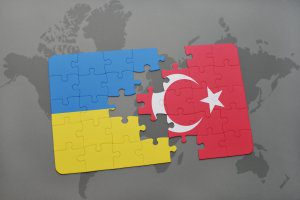
KYIV. Oct 25 (Interfax-Ukraine) – Ukraine has started the eighth round of negotiations on the signing of the free trade agreement (FTA) with Turkey, Deputy Minister of Economic Development and Trade, Ukraine’s trade representative Natalia Mykolska has said on her Facebook page.
“During the recent visit of President Erdogan [Turkish President Recep Tayyip Erdogan] to Ukraine special attention was paid to the increase of trade and intensification of the negotiations,” she wrote.
As reported, the FTA with Canada took effect on August 1, 2017.
Earlier representatives of the government said that the next FTA Ukraine could sign with Israel.
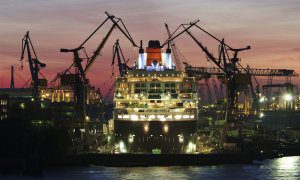
KYIV. Oct 24 (Interfax-Ukraine) – Kherson State Plant Pallada has completed building the new Ereneos composite dockage facility with a capacity of 7,100 tonnes on the order of Cypriot Multimarine Shipyards Ltd.
The plant told Interfax-Ukraine the enterprise had already completed testing the facility, its transfer to the customer is being prepared.
“Despite difficult weather conditions, during the testing all previously declared characteristics of the floating dock have been confirmed by the representatives of the owner and the American Bureau of Shipping (ABS). At present the classification of the dock at the ABS is being completed, after which it will be handed over to the customer,” the plant said.
He said after the transfer to the customer, the floating dock will be towed to Cyprus, where it will begin work in the port of Limassol.
Pallada plant is the only shipbuilding company in the world specializing in building the next generation composite floating docks for civil and navy fleet. The warranty period of operation of the equipment is 50 years.
Among the customers of the company are Japan, South Korea, Finland, Bulgaria, Turkey, Algeria, Croatia, France, and the Republic of South Africa.
Pallada has been part of Ukroboronprom state concern under the decision of the government of Ukraine since April 2011.
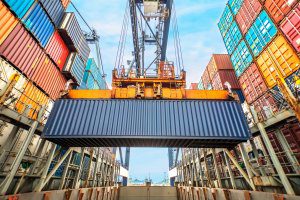
KYIV. Oct 24 (Interfax-Ukraine) – Some 154 new commodity items have been added to the list of exports to Canada, including special vehicles for $3 million, copper bars and profiles for $2.9 million and turbojets for $1 million, Deputy Minister of Economic Development and Trade, Ukraine’s trade representative Natalia Mykolska has reported.
“The largest growth was in non-raw materials. The rise concerns such positions as devices on rare crystals, sound electrical equipment, flour, equipment for processing rubber and plastic, equipment using X-rays, printing equipment. As for agricultural products, they include juice, honey, and sunflower oil. That means that positions with high added value are growing,” she said.
She added in monetary terms the new 154 export positions make up $10.2 million in total exports. In general, for the eight months exports of goods to Canada increased by 70.9%, or by $12.9 million compared to January-August 2016, to $31.2 million.
Canadian Ambassador to Ukraine Roman Waschuk noted exports in the new niche segments are growing most significantly, and in some of them the growth reaches 500% to 8,000%.
“Such figures mean that the new niches, previously unoccupied, are being occupied. The matter concerns energy equipment and agricultural machinery. Experience shows the increase in exports occurs initially at the expense of filling new niches and only then moves to the expansion of already existing export sectors,” he said.
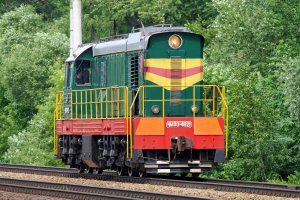
KYIV. Oct 24 (Interfax-Ukraine) – Latvian Railways is ready to lease some of unused locomotives to Ukraine.
According to an Interfax-Ukraine correspondent, such an initiative was announced by the director of production at the company at the international conference “Carriage Building and Rolling Stock Repairs” in Kyiv.
“We have free locomotives due to the fact that our carriers use more locomotives with a capacity of 6,000 hp. As we, the rolling stock service, are the owners of this rolling stock, I think we could lease them to Ukraine until you solve your problem with traction, we are ready,” he said.
Earlier Ukraine has repeatedly announced the problem of shortage of rolling stock and its critical wear and tear.
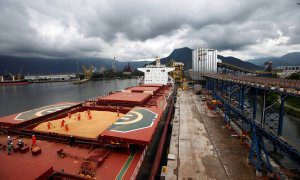
KYIV. Oct 24 (Interfax-Ukraine) – The construction of a grain terminal of Cargill and MV Cargo with a capacity of 5 million tonnes of grain a year in Yuzhny port, whose cost is estimated at $150 million, has reached the middle and will be fully completed in spring 2018, MV Cargo has told Interfax-Ukraine.
The company noted both stages of work are half completed: dredging at the future berth, which is carried out by China’s CHEC Corporation on the order of the Ukrainian Sea Ports Authority, and the construction of the ground part.
According to CHEC, it is ahead of schedule by more than 25%: some 2 million cubic meters of soil has been pulled out and now grab dredgers are working the in water area, which pull out an average of 20,000 cubic meters per day from the bottom.
MV Cargo said two covered warehouses with a capacity of 80,000 tonnes and 14 silos with a total capacity of 210,000 tonnes are currently being built on a site of 28 hectares.
As reported, Cargill (the United States), the Ukrainian Sea Ports Authority and MV Cargo in August 2015 signed a tripartite memorandum of intent to implement the investment project in Yuzhny port. Its launch was preliminarily scheduled for 2017.
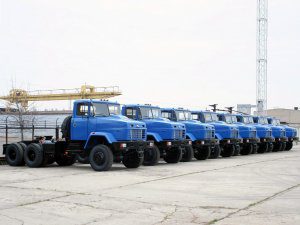
KYIV. Oct 24 (Interfax-Ukraine) – AvtoKrAZ (Kremenchuk, Poltava region), the only manufacturer of heavy trucks in Ukraine, has supplied the second batch (three units) of KrAZ-6443 all-wheel drive tractive vehicles to Dalgakiran Compressor Ukraine LLC (Kyiv), the leading Ukrainian supplier of diesel generators and compressor equipment.
According to the press service of AvtoKrAZ, the vehicles are designed for towing vehicles and special semi-trailers with a gross mass of 48 tonnes, have a full mass of a 59-tonne road train, and a vertical load on the fifth wheel coupling of 17 tonnes.
The press service notes the previous delivery to Dalgakiran Compressor Ukraine in late May this year included KrAZ-6322 all-terrain vehicles and a semi-trailer truck of the same model.
According to a press release, after fulfilling its obligations in full, this contractor signed an additional contract with AvtoKrAZ for the manufacture of all-wheel drive tractors, which was done.
AvtoKrAZ produces 33 basic models, more than 260 modifications and complete sets of KrAZ automotive equipment for work in all sectors of the economy and in the Armed Forces of Ukraine.